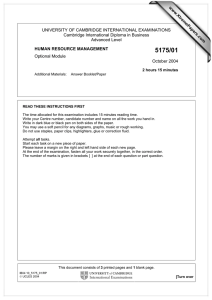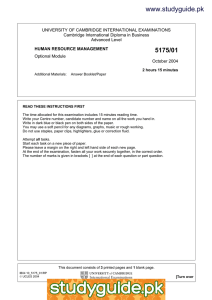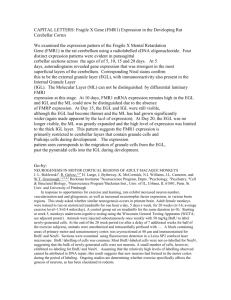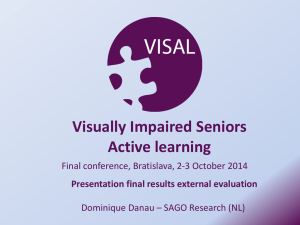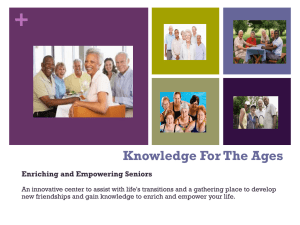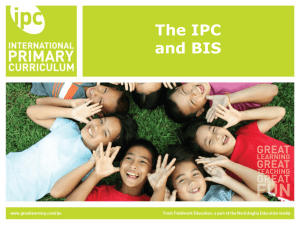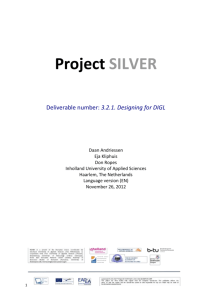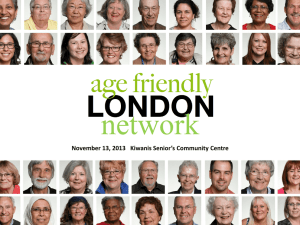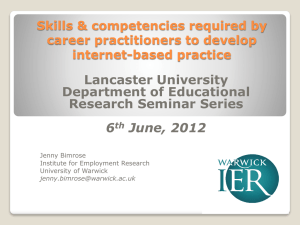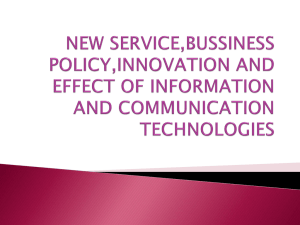Desk Research Synthesis
advertisement
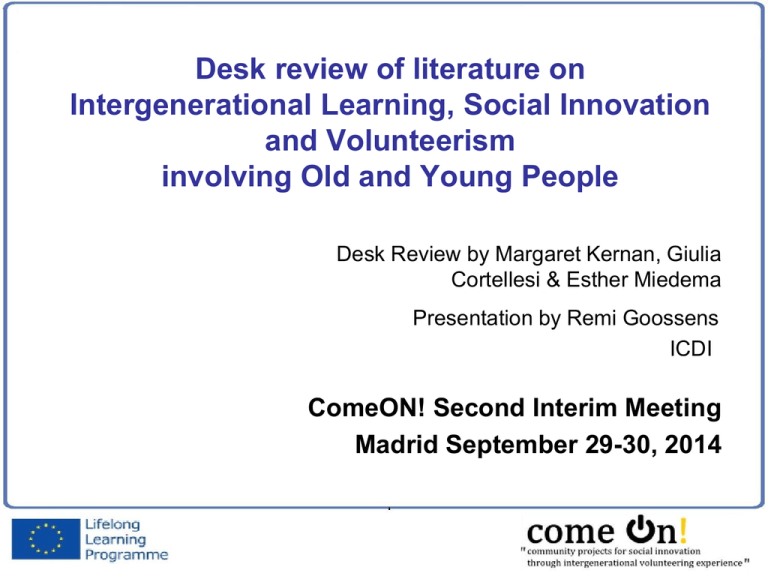
Desk review of literature on Intergenerational Learning, Social Innovation and Volunteerism involving Old and Young People Desk Review by Margaret Kernan, Giulia Cortellesi & Esther Miedema Presentation by Remi Goossens ICDI ComeON! Second Interim Meeting Madrid September 29-30, 2014 Outline of the presentation • Key concepts • Overview of results desk studies • Conclusion Key concepts (1) Intergenerational learning (IGL) involves different age groups learning together and from each other. This is seen as important in Europe of today as it facilitates a form of learning that might otherwise be diminished due to a growing age segregation. Experiential ‘education for life’ refers to comprehensive development of a person’s capacities during the full course of her/his life, no matter her/his circumstances. Social Innovation are strategies, ideas & activities which bring about positive change in communities, satisfying needs of all social groups & reinforcing civil society capacity. Key concepts (2) 21st century volunteerism: Volunteerism characterized by choice, solidarity & generosity. New type of formative volunteerism - systematically develops & pursues social learning & innovation, merging formal education with development of both life competences and critical norms and values. Phyrtual: the integration of physical + virtual (= phyrtual) elements in the pursuit of social learning & innovation. Key concepts (3) Intergenerational Solidarity refers to a ‘mutual support & cooperation between different age groups to achieve a society where people of all ages have a role to play in line with their needs & capacities, and can benefit from their community’s economic & social progress’ (Robertson, 2012: 86). Overview results: IGL in educational policy & curriculum • IGL not explicitly named in policy or curriculum guidelines for any type of secondary education. • But, in all countries (excl. Romania) social studies is included, addressing e.g. human rights & responsibility for others. • Varied delivery across countries, e.g.: - Italian Liceo’s – emphasis citizenship. All schools can propose projects linked to community needs. - Hungary & NL – compulsory community service & ‘social internship’. Social innovation in educational policy & curriculum • Explicit reference: - Italy: MoER 2013 guidelines for social innovation, e.g. creation of social innovation labs/zones. • More implicit references in: - Hungary: social inclusion & cohesion - NL: social change IG initiatives at a glance • 16 IG initiatives (IGIs) in the 5 countries involving YP between 15-19 years & seniors over 55 • ICT formed an important aspect in 8 IGIs & attempt was made to integrate virtual with face-to-face interaction, primarily to close digital gap (YP EP) • Face-to-face contact in other 8 IGIs - focus on transmission of history, values & professional skills (EP YP) Benefits The focus & approach shape the type of benefits: some initiatives emphasise on skills & learning outcomes (e.g. ICT), while others focus on social cohesion & fun (e.g. through culture). • Seniors: ICT, mentoring skills, sense of worth; • YP: develop social & professional skills; • Community: challenge stereotypes, tackle ageism, reduce isolation, improve cohesion, active citizenship, sense of belonging, ownership & fun. Skills • Organisational: preparation of participants and partners, ability to create synergies across generations & different types of organisations, content knowledge • Seniors: openness to working with YP, tolerance, empathy, facilitation skills, pro-activity • Young people: openness to working with seniors, punctuality, pro-activity, teaching skills, patience Preconditions for success (1) 1) Preparation, coordination and communication • Clear criteria to select volunteers, e.g. teaching skills, openness to IGI & IGL, project idea • Clarity on aims, roles, activities • Location - level of comfort & facilities, flexibility to address health issues & other unexpected circumstances • Clear communication plan and its effective delivery - essential to smooth running, creating & sustaining interest in, and support for projects. Preconditions for success (2) 2) Partnership, understanding and commitment • Quality of partnership between & commitment of, organizations/institutions and individuals • Clarity on level of understanding of, and commitment to, IGI & IGL more broadly, e.g.: Schools aware of educational potential of IGL projects Elderly people’s homes open doors to learners & schools and able to engage young volunteers on long-term basis • Active involvement of communities, schools and parents. Conclusion • None of IGIs to be defined as ‘phyrtual’; • Virtual components – where present – tended to be limited to provision of ICT lessons by young people to seniors; • Social innovation is weakly embedded in formal secondary school policy & curricula in most of countries studied; • Additional skills and preconditions required to ensure successful ‘phyrtual’ IGL initiatives.
